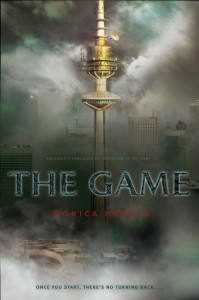 Summary: Living in a future plagued by overcrowding, Lisse and her friends are graduating into a world that has no jobs for them. Thanks to the robots who are now able to do almost every job there is, created when Earth’s population was in decline, Lisse is facing a life with no purpose, just pure leisure. Sticking together in the designated area for the unemployed youth, Lisse and the others make the best of their situation, until rumours of The Game reach them. Bit by bit, they collect details about The Game, hoping to be invited to play. And when they are, it will change their lives forever.
Summary: Living in a future plagued by overcrowding, Lisse and her friends are graduating into a world that has no jobs for them. Thanks to the robots who are now able to do almost every job there is, created when Earth’s population was in decline, Lisse is facing a life with no purpose, just pure leisure. Sticking together in the designated area for the unemployed youth, Lisse and the others make the best of their situation, until rumours of The Game reach them. Bit by bit, they collect details about The Game, hoping to be invited to play. And when they are, it will change their lives forever.
Number of Pages: 179
Age Range: 13-15
Review: CAUTION: REVIEW CONTAINS SPOILERS!
Imagine a world where graduating means becoming unemployed for all but a precious few. Like any good dystopia, it isn’t too hard, because this concept has more than a whisper of truth in our current society. But in Lisse’s world, when pollution begins to decrease the population, humans turn to robotics to fill the gaps in the work force. Eventually the human population rebounds, except by that point robots are doing so many jobs that humans are pretty much unnecessary. Unbeknownst to people outside the government though, steps are being taken to remedy the situation.
Hughes paints the government as being irresponsible, with possibly evil intentions as Lisse and her friends end up in what is essentially a ghetto. The rumour of The Game made me think of books like The Hunger Games by Suzanne Collins and The Running Man by Stephen King, but it wasn’t like either. Instead Lisse and her friends are subjected to something they don’t understand, believing it’s a game that has the potential to fulfill all of their dreams. It turns out not to be a game, but I couldn’t have been more surprised when I realised that though there were some false pretences involved, it was still the dream fulfillment they were looking for. Being sent to another planet and starting over gave them direction and meaning, and a chance to make a change for humanity as a species. In that way, Hughes’ story is profound.
Near the end, as Lisse is unravelling the reasons behind why each of them are there, she leaves out herself. At the very end though, she is revealed as the conscience of the group, the reflector, and the writer. It’s a great touch on Hughes’ part, because it shows the value of a community that thinks before it acts and is ultimately held accountable for their decisions. Invitation to the Game is Lisse’s reflections of what happened to them, and how they came to be starting over on a new planet, seeding humanity for the future. It’s an enlightening, philosophical read, and I look forward to enjoying more of the many books Hughes has written.
Memorable Quotes:
“We all moved over to give him room and introduced ourselves. He said his name was Charlie and that he’d been out of school and unemployed for a year. That surprised me. He seemed to me to be a whole lot older than that, but perhaps one aged fast in the city. It always seemed odd to me that our life expectancy should go down when ther was no poverty, nor the tension of having to earn a living. Maybe boredom was aging.” – Lisse’s impressions of Charlie from Invitation to the Game by Monica Hughes, page 35
“‘The “why” is simple,’ Karen answered. ‘Overcrowding. No jobs. An explosive situation getting worse. I don’t think they ever realized, when they invented the robots to take over after the population fell so drastically, that it would be impossible to get rid of them once things got better. It’s a problem governments have always had. You can’t go back and undo things – you have to go on, it seems, even if the mess just gets worse and worse.'” – Karen from Invitation to the Game by Monica Hughes, page 162
Invitation to the Game by Monica Hughes is published by HarperTrophy Canada, (1990).




 Amy Mathers has been passionate about reading from a very young age, and hopes others will share her enthusiasm for funding a teen book award.
Amy Mathers has been passionate about reading from a very young age, and hopes others will share her enthusiasm for funding a teen book award. 





